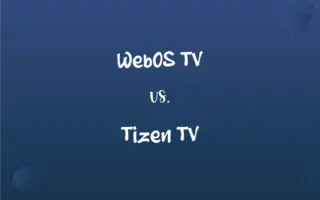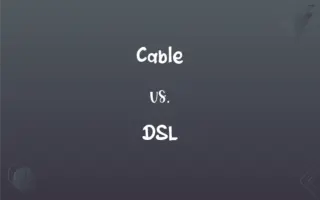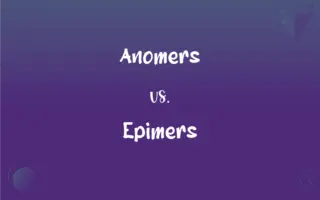Cloud Based vs. Server Based: What's the Difference?
Edited by Aimie Carlson || By Janet White || Published on February 18, 2024
Cloud-based refers to services hosted on the internet, while server-based pertains to services run on local or dedicated servers.

Key Differences
Cloud-based services store and process data on remote servers accessed via the internet. Server-based systems, in contrast, rely on physical servers located on-premises or at a specific location for data storage and processing.
Cloud-based computing offers scalability and flexibility, allowing resources to be adjusted based on demand. Server-based computing requires physical hardware management and may have limitations in scalability.
In cloud-based systems, maintenance and updates are typically handled by the service provider. Server-based systems require local maintenance, including hardware and software updates.
Cloud-based solutions often offer a pay-as-you-go model, reducing upfront costs. Server-based infrastructure usually requires significant initial investment in hardware and setup.
Data security in cloud-based services is managed off-site by the provider, whereas server-based systems require in-house security measures and data protection strategies.
ADVERTISEMENT
Comparison Chart
Data Storage Location
On remote servers accessed via the internet.
On local or dedicated servers at a specific location.
Scalability
Highly scalable with resources adjustable on demand.
Limited scalability, dependent on physical hardware.
Maintenance Responsibility
Handled by the service provider.
Requires local maintenance and management.
Cost Model
Often pay-as-you-go, lower upfront costs.
Requires upfront investment in hardware and setup.
Data Security Management
Managed by the service provider off-site.
Handled in-house, requiring dedicated security measures.
ADVERTISEMENT
Cloud Based and Server Based Definitions
Cloud Based
Cloud-based infrastructure offers flexibility and easy scalability.
They switched to a cloud-based infrastructure for its scalability.
Server Based
Server-based solutions can offer enhanced control over data and security.
They prefer server-based solutions for greater control over their data.
Cloud Based
Cloud-based services are hosted on the internet, not on local hardware.
Our email system is cloud-based, ensuring access from anywhere.
Server Based
Server-based infrastructure often needs manual updates and maintenance.
The IT team is scheduling a downtime for server-based software updates.
Cloud Based
Cloud-based systems provide remote access to software and databases.
She accesses the customer database through a cloud-based platform.
Server Based
Server-based refers to applications and services run on specific, dedicated servers.
The company's server-based system requires regular hardware maintenance.
Cloud Based
Cloud-based computing relies on shared computing resources.
The cloud-based app scales automatically to handle traffic spikes.
Server Based
Server-based systems are dependent on physical hardware and server capacity.
Upgrading the server-based network can be costly due to new hardware.
Cloud Based
Cloud-based refers to applications and services available on the internet.
Our company's data is stored in a cloud-based storage solution.
Server Based
Server-based computing involves local data storage and management.
Their server-based database ensures all data is stored in-house.
FAQs
Are cloud-based services more scalable?
Yes, they offer higher scalability compared to server-based systems.
What is cloud-based computing?
Computing services accessed over the internet, using remote servers.
Is cloud-based computing more cost-effective?
Generally, it can be more cost-effective due to lower upfront costs.
Is data more secure in a server-based system?
It can be, depending on the in-house security measures implemented.
Do server-based systems offer more control over data?
Yes, they typically provide more direct control over data and resources.
What does server-based mean?
Services and applications run on specific, dedicated servers, often on-site.
Do cloud-based services have better data backup?
Often, they provide more robust and automatic backup solutions.
Do server-based systems require more maintenance?
Yes, they often need more manual maintenance and updates.
Can server-based solutions be accessed remotely?
Access is possible, but it's more complex than cloud-based solutions.
Can cloud-based systems be customized?
Yes, but the level of customization may vary based on the provider.
Are cloud-based services easier to update?
Yes, updates are generally handled by the service provider with less user intervention.
Are server-based systems more reliable?
They can be more reliable if well-maintained and managed effectively.
Is an internet connection crucial for cloud-based services?
Yes, a stable internet connection is essential for cloud-based services.
Can cloud-based services be used for large businesses?
Absolutely, they are scalable and suitable for businesses of all sizes.
Is data migration easy to cloud-based systems?
It varies, but cloud providers often offer tools and support for migration.
How does downtime compare between the two?
Cloud-based services often have less downtime due to redundant systems.
Is initial setup easier for cloud-based systems?
Usually, cloud-based systems require less complex initial setup.
Are server-based systems becoming obsolete?
Not necessarily, as they still have applications where specific control or regulatory compliance is needed.
Do server-based systems require more IT expertise?
Yes, they often require more in-house IT expertise for maintenance.
Can cloud-based systems integrate with existing IT infrastructure?
Yes, but the level of integration depends on the existing systems and the cloud service.
About Author
Written by
Janet WhiteJanet White has been an esteemed writer and blogger for Difference Wiki. Holding a Master's degree in Science and Medical Journalism from the prestigious Boston University, she has consistently demonstrated her expertise and passion for her field. When she's not immersed in her work, Janet relishes her time exercising, delving into a good book, and cherishing moments with friends and family.
Edited by
Aimie CarlsonAimie Carlson, holding a master's degree in English literature, is a fervent English language enthusiast. She lends her writing talents to Difference Wiki, a prominent website that specializes in comparisons, offering readers insightful analyses that both captivate and inform.




































































